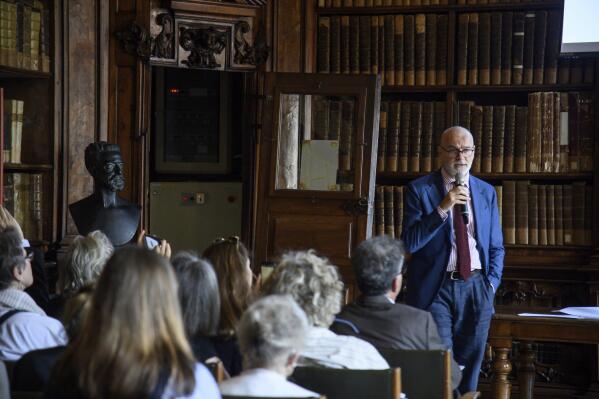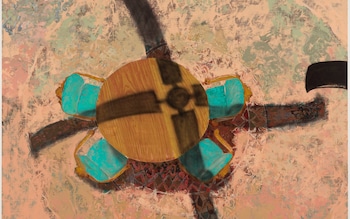When Jane Campbell opens the door of her home, a former pub in Old Marston on Oxford’s north-eastern shoulder, my eye is drawn to her skirt. It’s the rich purple immortalised in Jenny Joseph’s poem about being an old woman, which at 82 years old, Campbell is.
“I wonder if this will look deliberate,” she admits thinking while pulling it on, later telling me her colour choice followed her choice of shirt: a brightly patterned, floral affair. “I like the poem and applaud its sentiment. I approve the insistence on being difficult and not allowing society to squash one’s old self into a convenient respectable shape,” she says.
But Campbell does far more than smash societal conventions of ageing through her sartorial decisions. With Interpretations of Love, an adept tale about an undelivered love letter after a night of passion during the Liverpool Blitz, she has just become a debut novelist, two years after her first story collection, Cat Brushing, was published.
What’s more, it is the content – and quality – of those stories that makes them stand out, not the mere fact they exist. “I would hate it to be thought that [Cat Brushing] is a miracle because it was written by a 77-year-old woman as opposed to because it’s brilliant prose and interesting stories and amazing characters,” she says of the collection, which earned her comparisons with Edna O’Brien and Muriel Spark from the New York Times.
“The lust of an old man is disgusting but the lust of an old woman is worse. Everyone knows that,” Campbell writes in the opening story, Susan and Miffy, which is set in the hospital wing of a geriatric unit. We watch as 86-year-old Susan starts to feel something unexpected for her young carer, Miffy. “If she had known it was love she would have been surprised; if she had been told that it was lust she would have been horrified,” Campbell continues, setting the tone for a candid collection that upends every expectation of old age anyone younger than 80 probably holds.
“I write about old women as I would write about 40-year-old women negotiating their way through life given the circumstances in which they live,” says Campbell, who worked as a group analyst for nearly 40 years. “Close relationships usually include an element of physical intimacy and I believe that does not change much with age.”
Campbell was born in Hoylake, a seaside town in the Wirral, in 1942. She lived with her mother and great-grandmother: her medic father was missing in action. “I had an idyllically happy first four years.” But then, in 1946, her father, who had been in an Austrian prisoner-of-war camp, reappeared. Those pivotal early years made her feel people didn’t need husbands. “My mother was definitely more unhappy after he came back. But I was very attached to my father, so people did need fathers.” Rather than working for the new NHS, he took a job in a Copperbelt mining town in what used to be known as Northern Rhodesia. Campbell was sent to boarding school in Cape Town, “a five-day train journey over 3,000 miles, crossing the Victoria Falls four times a year. Absolute magic.”
Today, we are in her book-lined living room. Campbell is on the sofa where her former patients sometimes sat; I am in the inquisitor’s armchair. This is where she lives, alone, for half the year, spending the rest in Bermuda, the British island territory she moved to in the mid-1960s with her then-husband.
“As is so often the story with the colonies, men used to love it but wives would get pale and pensive and homesick. So after 15 years we split up,” she says, about her return to England in 1980 with their four young children, who are eternalised on their last Bermuda beach day in a framed fading photograph on her windowsill. She trained in group analysis after her divorce, loving how she could listen to people talk and get paid for it.
Campbell had always written fiction, sometimes sending pieces off “as a hobby” to various magazines or agents. Then Pat Kavanagh, the celebrated literary agent whose authors included Ruth Rendell and Margaret Drabble, saw some of her work and told Campbell she had “loved” what she’d seen. However, Kavanagh died shortly afterwards (in 2008) so that was that. Campbell felt Cat Brushing (the original story, written in just a few days in 2017) was good, so sent it to Mary-Kay Wilmers, the then-editor of the London Review of Books.
“She wrote about three weeks later, saying she’d love to publish it in the diary section. I had to tell her it wasn’t true, it was fiction. And they published it in the next edition,” says Campbell. Alice Spawls, the current LRB editor, encouraged Campbell to keep writing, helping her to find an agent.
Twelve further stories tumbled out, most with a sexual undercurrent, which reflects the decades Campbell spent listening to people talking openly about, well, everything. “My work [as a group analyst] gave me a sense of the complexity of most people’s lives. People are just so remarkable. One woman worked in a library; she looked like a librarian from central casting. She told me about this extraordinary affair with this black carpenter. I would sit there with the functional part of me doing my psychoanalytic [bit] and the other part, saying, God, isn’t human nature amazing! With group analysis there is a freedom that comes from talking to strangers. [Everyone] talks very, very openly about their sex lives. I think I got a bit de-sensitised.”
The collection caused quite a stir, not least among her neighbours in Old Marston. “Several expressed shock and disapproval that I wrote about sexual intimacies so frankly.” She gives short shrift to any hint that these stories are drawn from her own experiences. “I promise you, these stories are fictional. They’re titbits. I’ve read sex scenes. I’m speaking frankly to you now: I like women, to some extent, but any kind of sexual attraction is just not in my head.” She is similarly quick to dispatch any suggestion she is an authority on octogenarian intimacies. “Do I write about anyone who’s had sex in their 80s? No. So, asking me about that is an irrelevant question.”
In the acknowledgements to Cat Brushing, Campbell says her writing was fuelled by having “a head full of the words and images of Donne, de Maupassant, Keats, The Ancrene Riwle, Virgil, Schopenhauer among others, which lie alongside theories basic to the practice of group analysis”. Later, she adds male writers such as Saul Bellow, Norman Mailer and Joseph Conrad to her sources of inspiration. “My literary heroes, on the whole, are male…Because they write better than many women.”
She adds: “Overall, I’m sorry for men. I don’t know quite where this comes from. I think it comes from my childhood. I know [life] is so unequal and all that. But I can always see the pathos in men more easily than I can in women.”
In Interpretations of Love, which is written from three different viewpoints, Campbell expands her thoughts about psychoanalysis, drawing on Sigmund Freud and Carl Jung. I worry that psychoanalysis risks reducing people to stereotypes – what novelists strive to avoid, but Campbell is unequivocal. “I don’t think it reduces people but I do think that it can be used aggressively,” she says.
Luckily for her new readers, she has plenty of potential material. “I’m going on writing because it’s what I can do. My new one will be set in Bermuda. It’s very advanced in my head. It’s less advanced on paper.”
Interpretations of Love by Jane Campbell is out on 18 July from Riverrun, £16.99
Disclaimer: The copyright of this article belongs to the original author. Reposting this article is solely for the purpose of information dissemination and does not constitute any investment advice. If there is any infringement, please contact us immediately. We will make corrections or deletions as necessary. Thank you.




